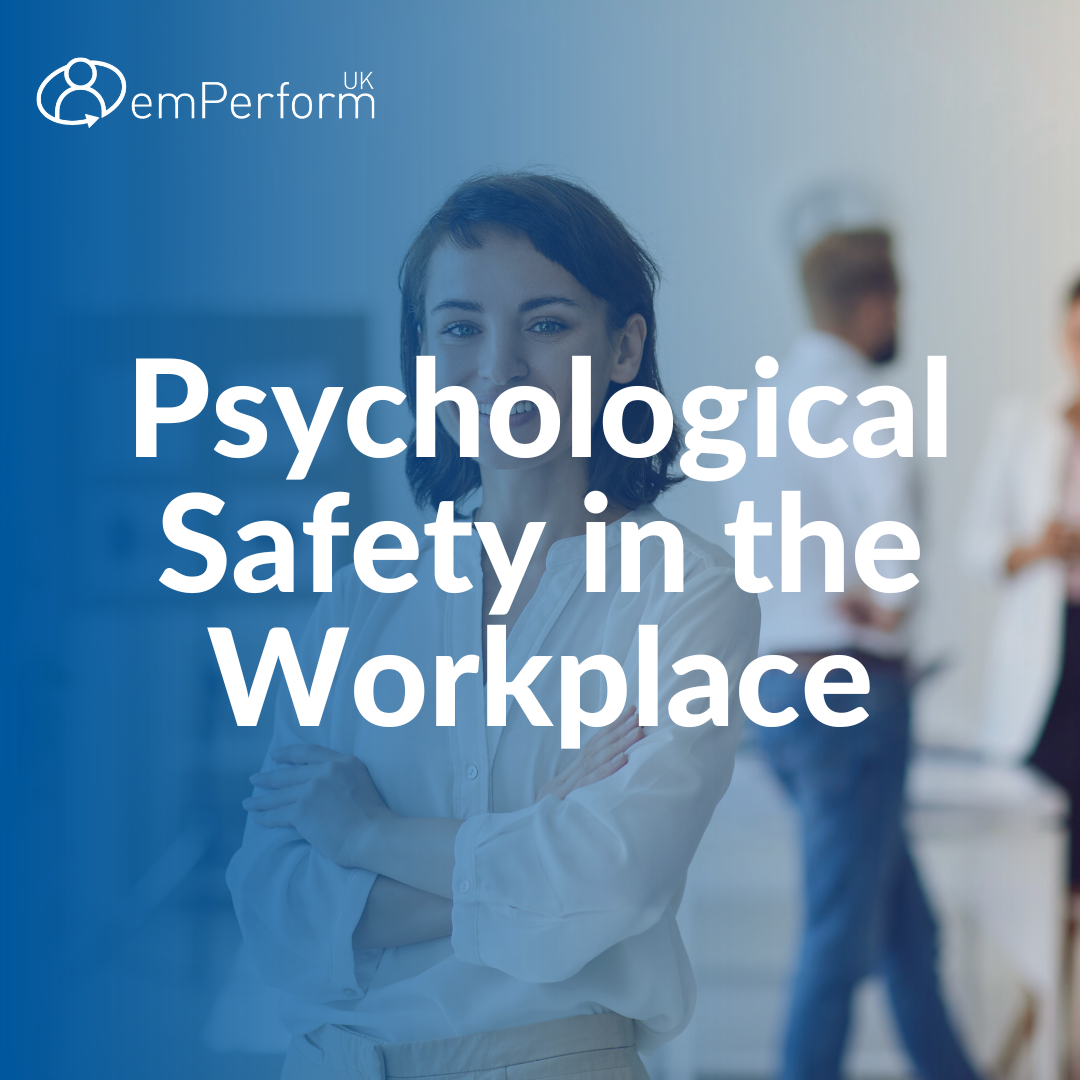
Psychological safety is a cornerstone of a thriving, inclusive workplace. It empowers team members to express ideas, raise concerns, and acknowledge mistakes without fear of criticism or repercussions. In an environment where psychological safety is prioritised, employees feel valued, supported, and motivated, contributing more effectively to the organisation’s success.
In this blog, we explore why psychological safety is essential for promoting a healthy work culture and the pivotal role employers play in nurturing it. Discover how these practices can lead to a more innovative, collaborative, and engaged workforce. At emPerform, we’re dedicated to providing the tools and insights needed to make these strategies a reality in your workplace.
What is Psychological Safety?
Psychological safety refers to the belief that one can express ideas, ask questions, or admit mistakes without facing negative consequences, such as judgment or punishment. Coined by Harvard Business School professor Amy Edmondson, psychological safety plays a vital role in team dynamics, helping to promote open communication, collaboration, and innovation. Edmonson describes it as, “felt permission for candour.”
In psychologically safe workplaces, employees trust that their thoughts and contributions will be respected, even when they challenge the status quo. This environment encourages healthy risk-taking, creativity, and adaptability which are all key drivers of business success.
Why is Psychological Safety Important?
Psychological safety is a critical factor for creating productive and resilient teams. According to a survey by McKinsey, an overwhelming 89% of employee respondents said they believe that psychological safety in the workplace is essential. By cultivating an environment where employees feel safe to express their ideas, take risks, and make mistakes without fear of negative consequences, organisations can unlock greater potential in various areas:
- Increased Innovation: When employees feel psychologically safe, they are more likely to share their creative ideas without fear of ridicule or punishment. Innovation thrives in environments where team members can experiment, suggest new approaches, and challenge the status quo. The key to innovation is the ability to learn from failures, and psychological safety allows employees to view mistakes as learning opportunities rather than setbacks.
- Stronger Team Collaboration: Psychological safety promotes a culture of open communication, which is essential for effective teamwork. When team members feel secure enough to speak their minds, it encourages honest feedback, constructive criticism, and more collaborative problem-solving. Without psychological safety, teams may shy away from addressing issues directly, leading to unresolved conflicts and inefficiencies. Furthermore, teams that feel safe are more likely to share information, leverage each other’s strengths, and make better, more informed decisions. This kind of trust-based collaboration also strengthens relationships within the team, building a stronger sense of unity and purpose.
- Higher Employee Engagement: Engagement is directly linked to how valued and supported employees feel within their roles. Psychological safety motivates employees to take initiative, share their opinions, and become more actively involved in achieving company goals. When employees know their voice matters and their contributions are respected, they are more likely to invest emotionally and mentally in their work. This heightened level of engagement leads to better performance, higher productivity, and greater satisfaction, overall improving workplace culture. In environments where psychological safety is lacking, employees may become disengaged, and hesitant to contribute beyond their basic responsibilities, which negatively affects team performance.
- Reduced Employee Attrition: High turnover can be costly, both financially and in terms of company culture. Psychological safety can significantly reduce employee attrition by creating a supportive work environment where individuals feel valued, respected, and understood. When employees feel emotionally safe at work, they are less likely to experience burnout or excessive stress, both of which contribute to higher turnover rates. Additionally, employees who feel psychologically safe are more likely to remain loyal to their company because they are not only satisfied with their work environment but also see opportunities for growth and contribution.
- Improved Mental Health: Psychological safety is not just about professional well-being; it’s also closely linked to mental health. A work environment that supports psychological safety minimises stressors that negatively impact employees’ mental well-being. When employees feel they can be themselves and share their concerns openly, it creates a buffer against anxiety, depression, and other mental health challenges. Moreover, feeling safe in the workplace leads to greater job satisfaction, reducing feelings of isolation, frustration, or helplessness. By supporting employees in this way, companies contribute to their overall well-being, nurturing a culture of care and inclusivity that enhances both personal and organisational success.
The Employer’s Role in Providing a Psychologically Safe Workplace
Employers play a crucial role in advancing psychological safety within their workplace. This responsibility starts with the foundational task of building trust across all levels of the team. Leaders should actively work to create a culture where open communication is the norm, not the exception. This involves not only encouraging employees to voice their thoughts and concerns but also being transparent about decisions and changes. By modelling the behaviours, they wish to see, such as demonstrating vulnerability, giving constructive feedback, and listening actively, leaders set a standard for others to follow. This approach helps to dismantle barriers that might otherwise inhibit open dialogueue and collaboration.
Additionally, it is essential for employers to equip their teams with the necessary tools, resources, and systems that support psychological safety. This includes providing access to training and development opportunities, implementing feedback mechanisms, and encouraging an environment where diverse perspectives are valued. By integrating systems that facilitate ongoing communication and support, employers ensure that employees feel heard, appreciated, and empowered.

7 Ways to Encourage Psychological Safety in the Workplace
Creating a psychologically safe workplace requires intentional effort and consistent action. Here are 7 ways to encourage such an environment:
Create an Open Environment
Promoting a culture of openness is crucial for enhancing psychological safety. Start by prioritising clear and transparent communication. Encourage employees to share their thoughts, ideas, and feedback openly during team meetings or through anonymous suggestion surveys, ensuring that every opinion is valued and respected.
Transparency in decision-making also plays a key role in reducing uncertainty and building trust across the organisation. Make it clear how and why decisions are made, so employees feel informed and included. Using tools like emPerform’s survey features to evaluate and improve the openness of your workplace, creates an environment where employees feel safe to contribute and express themselves.
Be Invested in Your Team’s Growth
When employees feel supported through training, mentorship, and development opportunities, they are more likely to express ideas and take risks without fear of judgment. Focusing on their personal and professional development cultivates a sense of trust and engagement, helping to create a culture where people feel valued and safe to contribute. For more insight on empowering your team to reach their potential check out our blog, ‘Mentoring for Employee Development.
Using emPerform to set and monitor SMART goals provides employees with clear direction and helps align their efforts with company objectives. Regular recognition, along with coaching and feedback through emPerform, builds confidence and trust, ensuring everyone feels secure in their growth and contributions.
Embrace Upward Feedback
Encouraging upward feedback is essential for creating a psychologically safe and inclusive work environment. When employees feel empowered to share their opinions, challenge ideas, and suggest improvements it fosters a culture of transparency, continuous learning, and growth. This not only enhances leadership effectiveness but also drives team success by promoting open dialogueue and trust.
Leaders can cultivate this environment by actively seeking and appreciating feedback. Responding constructively and making adjustments, when necessary, shows that employee input is valued. emPerform’s ongoing feedback and succession planning features make it easy to gather feedback on leadership practices and identify areas for improvement in communication, decision-making, and employee support. Integrating this feedback into leadership development and succession planning ensures that future leaders are aligned with organisational goals and enhances overall psychological safety.
Avoid Blame Culture
Mistakes are inevitable, but how they are addressed plays a crucial role in cultivating psychological safety. Instead of placing blame or singling out individuals, focus on a learning mindset, working to understand the root cause of the error and finding opportunities to improve processes or provide additional support. This approach shifts the focus from punishment to growth, creating a more supportive environment.
By responding to mistakes with curiosity and empathy, leaders inspire employees to take ownership without fear of harsh criticism. This distinction can often highlight the difference between leadership and management—a leader inspires employees to learn from their mistakes and continue progressing, promoting a culture of trust and continuous improvement.
Make DEI a Priority
Diversity, Equity, and Inclusion (DEI) are fundamental to creating a psychologically safe workplace. A LinkedIn study revealed that 60% of employees want business leaders to address diversity issues, and 80% prefer to work for companies that prioritise DEI. When employees feel included, respected, and treated fairly, they are more likely to engage fully and contribute meaningfully. Prioritising DEI through diverse hiring practices, inclusive training, and equitable daily interactions promotes a sense of belonging. Implement policies that address unconscious bias, celebrate diverse perspectives, and ensure all employees, regardless of background, feel heard and valued. For more on the importance of DEI in encouraging a safe and inclusive environment, check out our previous blog ‘Promoting Diversity, Equity & Inclusion (DEI) in the Workplace.’
Ongoing Feedback
Consistent, ongoing feedback is essential for supporting psychological safety in the workplace. Rather than relying solely on annual performance reviews, create a culture where feedback is an integral part of daily interactions. This can include regular one-on-one check-ins, peer reviews, and informal feedback sessions.
Providing feedback frequently helps employees understand their performance, identify areas for improvement, and feel supported in their roles. Tools like emPerform enhance this process with features like 360° peer reviews and real-time feedback, facilitating a culture of continuous recognition and coaching. Regularly evaluate and adjust your feedback practices to ensure they effectively support employee development and contribute to a psychologically safe environment.
Be Empathetic and Understanding
Empathy is a crucial trait for effective leadership and plays a significant role in promoting psychological safety. By understanding and acknowledging your employees’ professional and personal challenges, you demonstrate that you value them as individuals, not just as workers. This approach enhances overall employee well-being and fosters a supportive environment.
Take time to regularly check in with your team, listen to their concerns, and offer meaningful support. An empathetic leader helps create a sense of belonging and safety, leading to a more engaged and productive workplace. For more insights on the impact of emotional intelligence, explore our blog on the subject.

Creating a psychologically safe workplace is not just a matter of good practice; it’s a strategic imperative for modern businesses. By creating an environment where employees feel comfortable sharing ideas, taking risks, and making mistakes without fear of reprisal, companies unlock the full potential of their teams. This leads to increased innovation, stronger collaboration, higher engagement, reduced turnover, and improved mental health. Remember, the journey Towardss psychological safety is ongoing and requires consistent effort from leadership and all team members.
At emPerform, we are committed to supporting organisations in creating these positive, inclusive work environments. Explore our tools and resources to help you implement these strategies and enhance your workplace culture. Book a FREE demo today or contact us for any advice on performance management.


Recent Posts